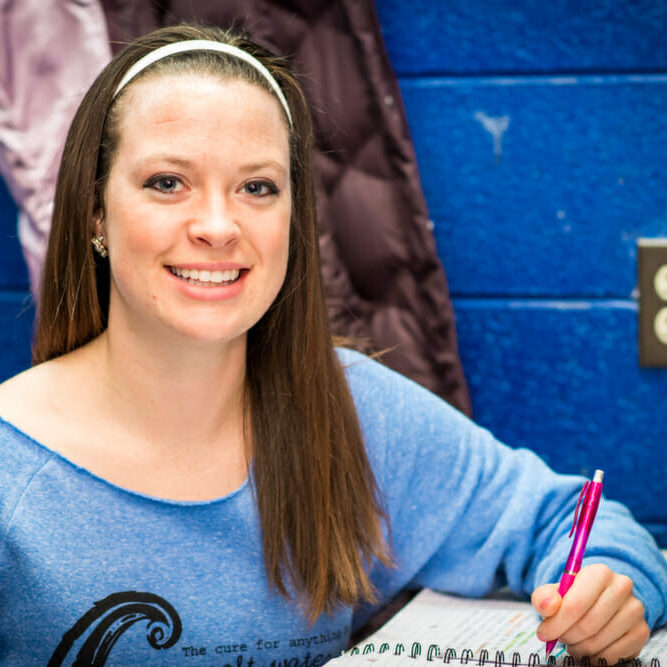

Morgan Hawkes spoke about her experience with mental illness at an open mic event earlier this month. (Photo by Chris Parent)
The first lines on the roadmap to where Morgan Hawkes found herself only a few weeks ago, inside the bounds of a mental health ward, could have been plotted several years ago.
It began in high school. Each year, for about a month at a time, she battled something. Whether it was the panic attack that hospitalized her, sleep deprivation or losing interest in the sports she loved, her mental health was only constant in its upheaval.
She wasn’t shy about sharing these struggles with the people closest to her. She grew up in a single parent household, and her mother was always there for her. Her friends were supportive, too.
When high school was nearing its end, she wrestled with the decision to leave Fredericton and come to Dalhousie. She knew the change might hinder her mental health, but decided the personal growth would outweigh the costs.
That first year of university was challenging. Her debut season on Dal’s cross-country team was strong, but she battled anxiety and earned a less than impressive 1.85 GPA. Her anemia, the result of a decrease in red blood cell counts, elicited fatigue and poor recovery after workouts.
Despite numerous setbacks, she always got back up and brushed herself off.
Hawkes’ second year at Dal was a drastic improvement. She met her boyfriend, Matthias Mueller, who she is still with today.
She also looked within herself for comfort.
“You could ask anybody on the team, I definitely matured a lot,” she says. “I got my priorities in line. I guess you could say I sucked it up a bit more.”
Hawkes’ story, though, does not end there. She spent the majority of last fall, now her third year as a kinesiology student, battling depression. Again, she pressed forward. She didn’t seek outside help, kept taking anxiety medication and relied on her support network to help her get by.
By January, her situation worsened.
She slept for no more than an hour or two before a track and field meet on Jan. 18. That day, her mental capacities collapsed.
Hawkes expelled all her energy into her leg of an 800-metre relay, and was still about 14 seconds slower than her usual time.
It was then that her head coach Rich Lehman asked if she wanted to go to the hospital.
“And I remember completely bawling, getting down into the fetal position and being like, yeah, I think I should,” recalled Hawkes.
Looking back, Lehman knows the signs were there in the days preceding the race, when conversations with Hawkes began making less sense.
“I don’t really know how to describe it—I do now—it got to the point where by the meet, it was very clearly a manic issue,” he says, “but a week before then it was like, man, Morgan’s in a great mood.”
***
The few days before and after Hawkes’ admittance into the Abby J. Lane mental health unit at the QEII Health Sciences Centre are faint memories. She remembers a few moments that make her laugh, like when she donated some of her belongings because she thought it was Christmas.
“Honestly, until that day [at the track meet], I probably had four days where it’s a big blur prior to being in the hospital. It took that day to realize there was something wrong that I wouldn’t be able to fix by myself,” she says.
Hawkes was diagnosed with bipolar disorder, a condition where individuals experience elevated moods, which are often countered by periods of depression.
On Feb. 11, she was discharged from the psychiatric ward. As fate would have it, she ran into an individual in the SUB who was inviting people to an open mic session put on by the Dalhousie Mental Health Peer Support Group.
Only hours after her discharge, Hawkes found herself standing in front of a room of mostly strangers, telling her tale. The people close to her had been aware of her challenges—now she was confident enough to go public.
“I had someone tell me afterwards, ‘You seem like you’re at peace, you seem like you’re very sure of yourself,’” she says. “It was pretty liberating; that’s exactly how I feel.”
There is no cure for bipolar disorder. Hawkes anticipates she will take medication for the rest of her life, and encounter similar struggles again.
Hawkes admits she’s still dealing with the aftereffects of her three weeks in a mental health ward, but she is in a happier place. Last weekend, she was a trainer with the Tigers track and field teams at the regional championships. She hopes to resume competitive running soon.
“I’m really enjoying doing things based on what I want to do, and not based on what anybody else wants me to do.”
Lehman says the 20-year-old’s challenges have been a learning experience for everyone, from Hawkes to her teammates and himself. By knowing about one more person battling a mental illness, more people will learn how prevalent and serious they are.
“I’ve learned a lot over the last few weeks because I plan on coaching this girl for a lot longer. I don’t plan on this being the end of her [running] career and I don’t think she does either,” he says.
Hawkes will discuss her bipolar disorder for a class presentation open to the public. It will take place Monday, Mar. 3 at 2:30 p.m. in the LSC, room C236.






